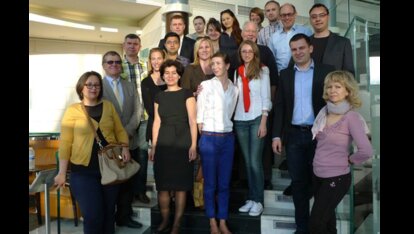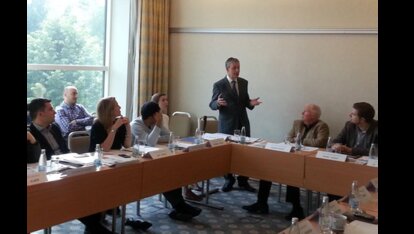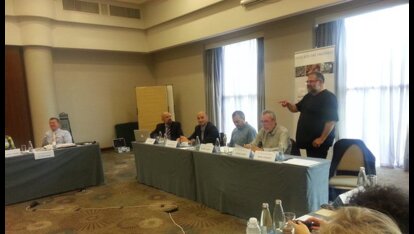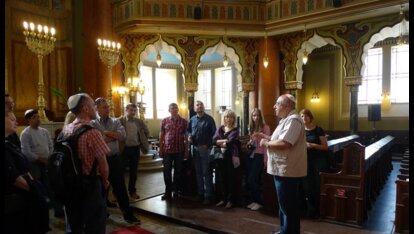Promoting Tolerance 2014: Minorities as "Convenient" Victims of Hate Speech
What are the current challenges facing the fight against populism and extreme nationalism in the political arena? Where do you find such a radicalized environment and why? What must Liberals do to protect minorities from the attacks of extreme political forces? What would an effective liberal approach towards populist and nationalist rhetoric look like?
These and other questions about the protection of minorities as well as of citizens’ and minority rights were discussed again this year by 15 young professionals from government, academia and civil society in the Foundation’s regions of Central, East and Southeast Europe, South Caucasus and Central Asia (CESE) under the “Promoting Tolerance” programme. The Friedrich Naumann Foundation for Freedom (FNF) and the American Jewish Committee (AJC) have conducted this programme together since 1992; its aim is the strengthening of democracy, pluralism and minority rights in the CESE region.

The Promoting Tolerance 2014 Participants
First, the participants were introduced to the principles of international understanding and the basic issues of civil and human rights through an online phase. Then, in June, this year's participants from Azerbaijan, Georgia, Serbia, Croatia, Bosnia and Herzegovina, Russia, Bulgaria, Poland, Slovenia, Romania, Ukraine, Tajikistan and Kyrgyzstan assembled in Sofia, the capital of Bulgaria, for a two-day introductory training - "Protecting minorities in radicalized political environments - What must liberals do?"
Daniel Kaddik, Project Manager for Southeast Europe, and Rabbi Andrew Baker, Director of International Relations of the AJC, jointly introduced this important but sensitive subject. They stressed the great importance the promotion of pluralism, peaceful coexistence, understanding and recognition of minorities has for the work of the two partner organizations.
A lively discussion was sparked by Dr Solomon Passy, a former Bulgarian foreign minister and an alumnus of the programme. In his opening speech, he spoke about the Russian-Ukrainian conflict and its impact on the issues of minority and human rights in the region. He made it clear that conflicts like this one, with such a clear political character, need much stronger and more active engagement and an uncompromising commitment to the values of freedom, democracy and respect for human rights by the European politicians and the international community.

Dr Solomon Passy
On the second day, the participants were trained in argumentation and discussion techniques and, in an intense brainstorming session, argued liberal positions against radical attacks on minority groups. This was followed by a role play in which the "pros" and "cons" were discussed of the prosecution of hate speech in order to protect minorities versus the liberal principle of freedom of speech. They also discussed the question to what extent legal instruments are effective in protecting the rights and interests of minorities and what other tools could be used for this purpose.
A subsequent panel discussion entitled "Minorities as the "convenient" victims of hatred in contemporary Europe: the challenges of combating populism and extremist nationalism in the political arena - the case of Bulgaria", brought together five former programme participants: Dr Atanas Slavov, assistant professor of Constitutional Law, Roumen Dunov, freelance writer, journalist and economist, Victor Lilov, historian and member of the City Council from the political alliance “Reformation Block”, Deyan Kyuranov, Programme Director of the Centre for Liberal Strategies in Sofia, and the moderator of the discussion, Iliya Lingorski, economist and former Deputy Minister of Finance of Bulgaria.

After an intensive exchange of views on the nationalist and populist tendencies in Bulgarian politics and on the situation of national minorities, the participants came to the conclusion that the extremist tendencies in politics are the new plague of Europe and, at the same time, pose a threat to tolerance. Nevertheless, the extreme radicalization of political communication offers an opportunity for liberal ideas as it provokes a natural desire for the liberal values such as freedom, the rule of law and tolerance. That's why the increased use of liberal ideas in the European societies is of central importance and must be promoted.
A symbol of peaceful coexistence is Sofia’s historic centre, where various religious minorities have left their mark over the centuries and still live together. The participants could experience this on the last day of the seminar during a walking tour through historic Sofia and relive it through a meeting with representatives of the Jewish community in the Sofia Synagogue.

At the synagogue in Sofia
The third phase of this year's “Promoting Tolerance” programme is a study trip to the U.S. in October. At the invitation of AJC, this the group will visit several U.S. cities and will discuss the American experience of pluralism and the integration of minorities with representatives of political, religious and civil society organizations.
Go to the picture gallery
Neli Kaloyanova
Coordinator Regional Dialogue Programmes &
Project Management